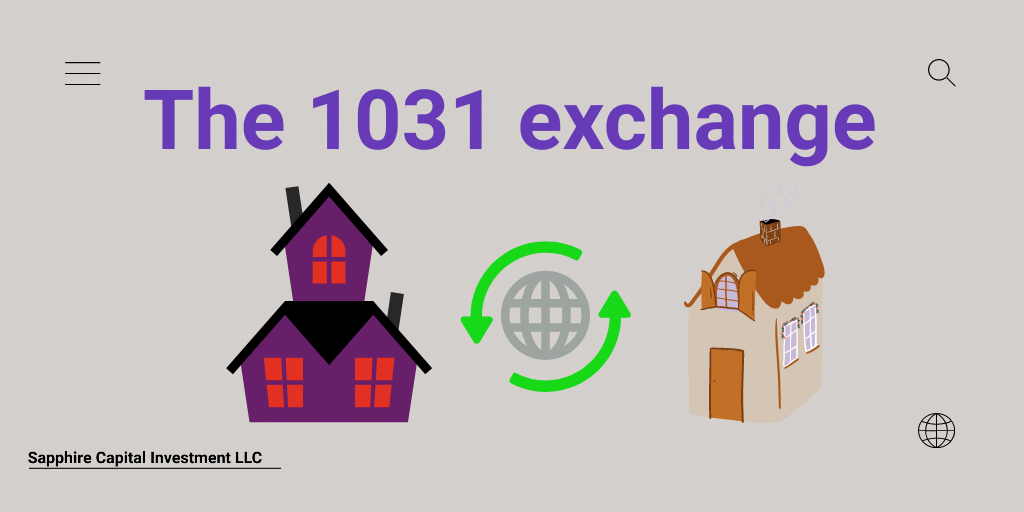By Sapphire Capital Investment
Looking forward to selling your investment property in Tucson, Arizona? The 1031 exchange is a legal tool used by investors such as yourself to defer capital gains tax and other federal income taxes.
Selling property realizes a combination of state and federal taxes. Depending on the size of your property, you can find yourself paying up to 15 to 20% of your property’s value in taxes. However, there exists an option where the taxes on your Tucson property can be rolled over.
Under Section 1031 of the Internal Revenue Code, investors can exclusively enjoy a tax deferment. Owners of investment property can sell and purchase property of the same class, provided that certain conditions have been met. This article seeks to unpack the rules and definitions of the exchange and help Tucson proprietors who want to take advantage of it in the nearby future.
Provisions by the IRS
From the requirements stated in section 1031, the proceeds of a real estate sale can only be reinvested in property of a similar class. This doesn’t apply to residential property or property bought by developers and flipped for a quick sale.
This is often a question asked by property owners and developers. The 1031 exchange only applies to properties used for trade/ investment purposes and prohibits the incorporation of properties bought for purposes of habitation or resale.
The tax deferment tool is also known a like-kind exchange. However, to clearly understand which types of properties can be exchanged through it, a more profound explanation is required.
A property in Tucson used for trade or business of any kind (legal, of course) will meet the threshold of being transferred through a 1031 exchange. As an example, a farm owner can be exchanged for a small office block Downtown. This is possible since both properties are primarily used for trade. That said, you can imagine the intriguing combinations available.
With the introduction of use of property as short-term rentals (Airbnb, Booking.com and the like), it could be argued that second homes are being used for investment. You might need to show proper records in order to justify this. In addition, it is recommended that you consult a tax specialist and a reputable real estate professional who can advise you accordingly.
Price of property
Although the 1031 is a tax-deferment tool, you can still pay taxes on it. There are two financial conditions when it comes to the original and replacement:
- The purchase price of your replacement property should be equal or greater than that of your original property.
- Secondly is the issue of mortgage. Let’s say that your original property had a mortgage, you will be required to use as much debt when purchasing the new property.
Failure to meet these conditions will lead to receipt of ‘boot’ (explained below) which is taxable.
The timings of the 1031 exchange
After the sale of your investment property, you have 45 calendar days to narrow down on three possible replacement properties. As stated above, the replacements should be of a like-kind/ of a similar class. The 45 calendar days timeline is inclusive of any holidays and weekends.
The Internal Revenue Service is known for its strict adherence to timelines and schedules. The same will apply here. Failure to meet any timelines in the provisions of Section 1031 of the IRC and the exchange will be deemed null and void. All corresponding taxes from the sale will have to be paid in full.
Once you have found your ideal replacement, the IRC provides that the purchase must be completed either within 180 calendar days or before the due date for the tax year in which the previous property was sold; whichever comes earlier.
Your 180 days start on the day your property transfers to the buyer.
A Qualified Intermediary (QI)
For the exchange to be carried out, you will need to look up the services of a Qualified Intermediary (QI). As the name implies, the QI serves as a go-between. He or she will play quite a vital role in the exchange.
Once the original property, the QI will hold the sale proceedings for you. The purchase of the replacement property will also be handled by the QI and later on the title will be transferred to you.
As a property owner, you know of the technicalities that come with property ownership and transfer. It is recommended to choose a professional Qualified Intermediary. The inclusion of the conditions of the 1031 exchange increases the stakes significantly. Any omissions in terms of the deadlines or other provisions will lead to payment of both county and state taxes.
It is also prudent that we specify just who can serve as a QI. Section 1031 specifies that a family member cannot serve as your QI and neither can someone who qualifies as your ‘agent’. This includes your real estate agent, broker or attorney.
Boot
During the transfer of the like-kind property, the buyer may receive money or other receivables that are not like-kind in nature. Such additions are recognized and allowed for in a 1031 exchange. The technical term is ‘boot’. Sources of boot include cash boot, debt reduction boot, property tax prorations and excess borrowing among others.
Therefore, it is always recommended for the investor to trade up. Trading down will automatically result in certain receivables, negating the tax-free nature of the1031 exchange.
In conclusion
Tucson real estate investors are enjoying the benefits of a 1031 exchange. Over time, it has proven to be an efficient tool, allowing investors to say billions of dollars.
But the exchange is highly technical and requires specialized knowledge. Reach out to the experienced real estate specialists at Sapphire Capital Investment. Our extensive knowledge in the industry makes as an essential partner for property investors in Tucson. With the sound advice of our professional team, you can comfortably and safely navigate these waters.







